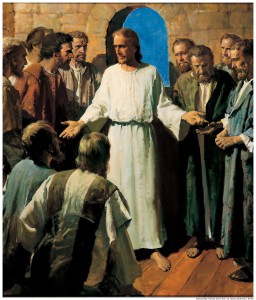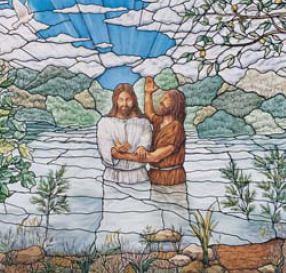
Most people live and die without the opportunity to hear of Jesus Christ or his atonement.
Yet, his atonement is the only way for us to return to live with our Heavenly Father. And, God requires that we accept Jesus’ atonement by making promises (covenants) through ordinances (such as baptism), and keeping those promises.
This is one key reason that Mormons build temples. Within temples, members of the Church engage in proxy ordinances–this means that they perform the ordinances in behalf of someone who is dead.
An example
For example, let us imagine that John is a member of the Church. John loves the gospel and the atonement of Jesus Christ. He realizes, however, that his grandfather Henry did not know about Jesus Christ. Henry was a good man, but he was not a religious believer. John wishes to provide Henry the opportunity to accept Jesus’ atonement.
Therefore, John would go to a temple, and would be baptized in Henry’s name. The ordinance would be the same as it was for John when he was baptized–a member of the Church’s priesthood would say the baptismal prayer, then place John beneath the water, and raise him up again. The only difference is that the prayer offered would say, “I baptize you in behalf of Henry, who is dead.”
Proxy baptism does not automatically save

Just as members of the Church believe that we existed as spirits with God before we were born, they also believe that our spirits continue to exist after death. Our personality, ability to choose, and sense of right and wrong continue after we die. Those who have not heard about the plan of happiness and Jesus’ atonement will be taught after their death. They can choose to accept or reject that message, just as those on earth can accept or reject it.
But, because the dead do not have physical bodies, they cannot be baptized–therefore, members of the Church provide the baptism in their behalf as a service.
Members do not know who will accept the baptisms, and who will not. It is possible that John’s grandfather Henry will not choose to accept Jesus. In this case, the baptism would be null and void–only Henry’s willingness to make the covenant of baptism gives it any power. Thus, John does not believe that he has “made Henry a Mormon.” He has merely given Henry the chance to accept the gospel if Henry chooses to do so.
The idea of baptism in behalf of the dead is not new. It is taught in the Bible, and practiced by some early Christians.
To learn more:
- “Baptism for the dead,” fairmormon.org.
